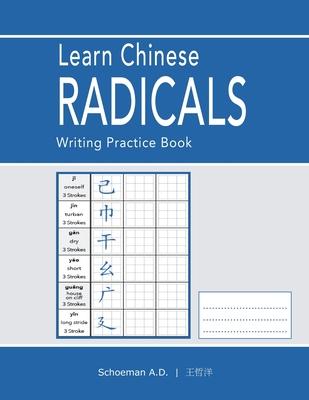This is a book to practice the 214 standard Chinese radicals in.
In This Book You Will Find:
- Material for students new to the writing and reading of Chinese characters.
- A list of the 214 standard Chinese radicals and their variants in both Traditional and Simplified Chinese characters.
- A page spread that consists of 12 radicals provided in the left column, and 16 writing boxes per row to practice in.
- Each radical can be written 16 times, across two pages.
- Blank pages provided for copying.
Every radical is provided with its:
- Pinyin pronunciation
- Meaning in English
- Number of strokes
The list provided is 100% correct, but Chinese radical lists found online can vary due to several factors:
- Historical Variations: Throughout history, there have been different categorizations and interpretations of radicals, leading to variations in radical lists.
- Simplification and Standardization: The Chinese writing system has undergone reforms, such as simplification in mainland China and traditional forms in Taiwan and Hong Kong. These reforms may result in different radical lists being used in different regions.
- Scholarly Interpretations: Different scholars may have different perspectives on which components should be considered radicals, leading to variations in radical lists.
- Educational Curriculum: Radical lists used in educational materials may be tailored to suit the specific needs of learners or the requirements of the curriculum, resulting in variations.
- Usage and Frequency: Some lists may prioritize radicals based on their frequency of use or importance in understanding characters, leading to variations depending on the purpose of the list.
Overall, the variation in Chinese radical lists reflects the complexity and richness of the Chinese writing system, as well as the diverse perspectives and needs of learners and users.
Radicals serve as headers in dictionaries, organizing characters or words. The 214 Kangxi radicals specifically categorize entries in the Kangxi dictionary; they are not universally employed in other dictionaries, unless another dictionary deliberately adopts the same radical set. Consequently, if a smaller dictionary opts not to include some obscure characters found in larger or more comprehensive dictionaries, it may lack the complete set of Kangxi radicals.
The Kangxi dictionary, being Traditional Chinese, uses its distinct set of radicals, which differs from those used in Simplified Chinese dictionaries. However, entries in Simplified Chinese dictionaries may still be rooted in the Kangxi dictionary.
Radicals, whether Kangxi or otherwise, are essentially arbitrary. They often bear little relation to a character's meaning or pronunciation. Therefore, it's entirely acceptable for a new dictionary publisher to devise their own radical system for character grouping.
